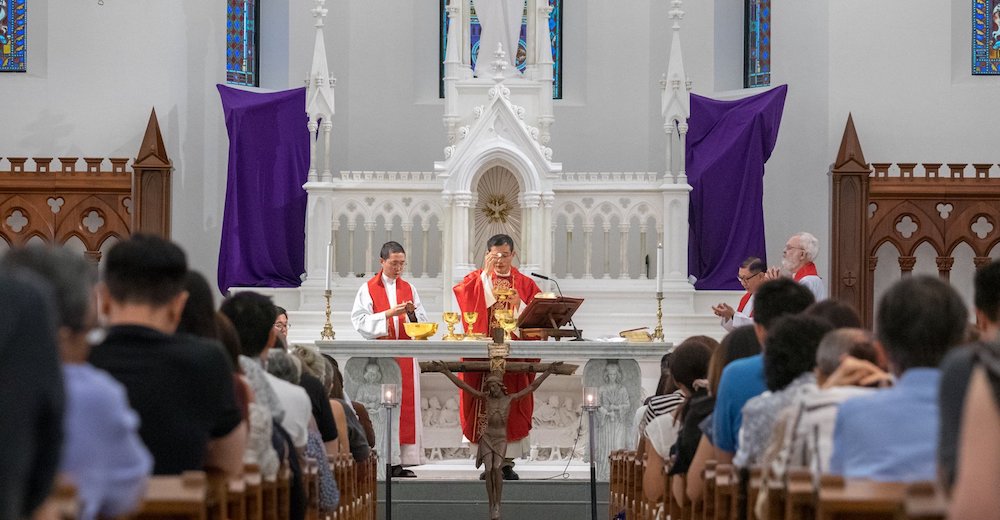On Dec. 14, 2020, the Multi-Ministry Taskforce announced that Phase Three will commence from Dec. 28, 2020.
Since then, the Ministry of Culture, Community and Youth (MCCY) has outlined the activities that are permitted to resume in places of worship during Phase Three.
In short, religious organisations will be allowed the following for worship services:
- Higher capacity limits for worship services
- Live performance elements
Worshippers can also participate in these activities in a larger group of not more than eight persons, with the default one metre safe distance between groups.
Up to 250 pax for worship services
From Dec. 28, 2020, religious organisations will be allowed to conduct congregational and other worship services at places of worship with up to 250 persons at a time, subject to safe management measures and the safe capacity of the premises.
This is more than twice the number of worshippers allowed at a worship service in Phase Two, which only allowed for up to 100 persons to congregate.
This figure excludes religious and supporting workers.
Worshippers to be in segregated in zones with no more than 50 pax each
For congregational services exceeding 50 persons, worshippers have to be separated into zones holding no more than 50 persons each.
To prevent intermingling across zones, zones must either be separated by a physical solid partition or a continuous physical barrier (such as a rope barrier).
At the same time, staggered entrance or exit timing must be in place to ensure that worshippers from different zones do not mix when entering or leaving places of worship.
The duration of worship services will be kept short and there must be no reception or mingling between worshippers, before, during or after each worship service.
All worshippers (except children below six years of age) must wear a face mask at all times, while young children are encouraged to use a mask or face shield.
Live performances will be permitted
For those involved in the conduct of worship service, up to 10 persons will be allowed to unmask at any given time.
Within the 10, up to five persons will be allowed to unmask for singing.
Worshippers and those involved in live performance elements are to be spaced at least three metres apart.
No sharing of prayer items
MCCY highlighted that there should be no sharing of prayer and other common items as it increases the risk of Covid-19 transmission.
Some examples include:
- Holy books
- Passing of offertory baskets
- Prayer mats
Worshippers are to bring along their personal prayer items instead.
Enclosed prayer spaces to be ventilated after each use
For places of worship with reduced air circulation, such as enclosed prayer spaces or air-conditioned worship halls, doors and windows are to be opened to ensure natural ventilation of the space after each use.
Marriages
Places of worship may continue to conduct marriage solemnisations for up to 100 attendees (excluding the solemniser, as well as religious and supporting workers).
But from Dec. 28, 2020, solemnisations at places of worship may also involve live instrumental music (non-wind) with the necessary safe management measures in place.
However, no other performances, such as singing, dancing, or acting, are allowed.
Funerals
Funerals, wakes, installation of niches and post-funeral rites at places of worship can involve not more than 30 attendees at any time (excluding religious and supporting workers).
No reception with food and drinks will be allowed.
From Monday (Dec. 28), funerary-related activities at places of worship may involve live instrumental music (non-wind) with no other performances allowed.
Safe capacity in the place of worship
From Dec. 28 2020, the following permitted religious activities (excluding congregational and other worship services) can take place with a total capacity of 150 persons (an increase from 100 persons in Phase Two):
- Marriage solemnisations
- Funerary-related activities
- Religious classes
- Recording and broadcast of religious services and prayers
These activities can be conducted safely at separate locations within the place of worship.
MCCY also added that it can suspend a religious organisation's activities if there are gaps in their safe management plans.
More details can be found here.
Top image via MCCY/FB
If you like what you read, follow us on Facebook, Instagram, Twitter and Telegram to get the latest updates.

